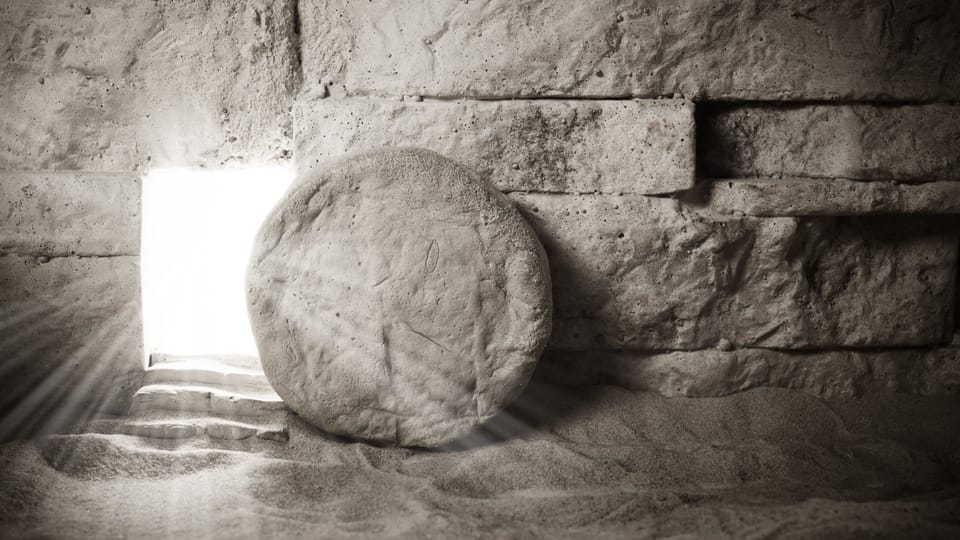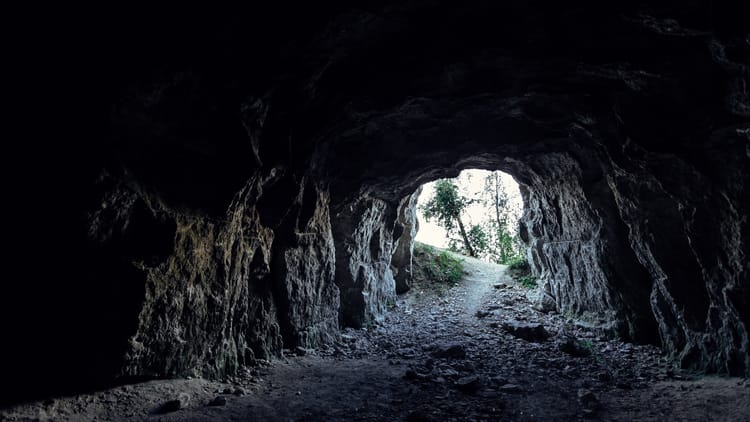Hope When We Face the Worst (Psalm 27)

Big Idea: Desperate is normal. We can turn to God in our desperation, and we can find hope — resurrection hope — even as we face the worst.
In 2010, for one of the first times in my life, I felt anxiety. I felt afraid. I don’t remember feeling that way before, and I don’t think I’ve felt that way very often since, but I felt it then, and it bothered me. I knew I needed to take some corrective action.
And I did. I began to regularly visit with a counselor and spiritual director. I took three months off from ministry. I began to try to understand why I was struggling with fear and what I should do about it.
And these words kept me going during this period of fear:
The LORD is my light and my salvation;
whom shall I fear?
The LORD is the stronghold of my life;
of whom shall I be afraid?
When evildoers assail me
to eat up my flesh,
my adversaries and foes,
it is they who stumble and fall.
Though an army encamp against me,
my heart shall not fear;
though war arise against me,
yet I will be confident.
(Psalm 27:1-3)
I once heard someone say that when you’re in crisis, you should find a passage of Scripture and cling to it like a life preserver. This was that passage for me. This passage kept me afloat during this period of surprising fear in my life.
We’re on a yearlong journey through the Bible, and we’ve got to the part where Israel has a king. Today’s passage was written by that king — specifically, the second king of Israel, King David. You’ll notice at the top of Psalm 27 that it says, “A Psalm of David.”
David was not only Israel’s greatest king, but he was also its chief songwriter. Almost half of the Psalms — 73 of the 150 — were written by David. That’s why I want to pause here in our journey through the Bible to look at one of his psalms. First, we have to acknowledge how remarkable it is that the Bible contains a whole book of songs — 150 of them. The Bible doesn’t just give us information. It gives us music.
What he gave us are songs. He gave us poetry, which itself reflects the beauty of God himself and how he wants to enchant, allure, woo, and draw us up into him.
He is supreme beauty. He has given us these gorgeous poems to pray to lift us up into beauty—to change us, to glorify us, and lift us up in deeper glory. He wants us not to be drawn down in the way that sin is pulling us down in the gutter of this world. He wants to lift us up. (Dane Ortlund)
Here I want to look at one of these Psalms because I think this is really going to help us as many of us know what it means to experience anxiety. We know what it’s like to be full of fear. This psalm by David is going to help us.
Not only that, but it’s very fitting for today. Today, of course, is Easter Sunday. I wondered where we would be in our journey through the Bible as we came to this special day. I’m glad we’re at this part of the Bible’s story because this psalm points us to the hope that we have because of the resurrection of Jesus Christ.
How do we respond to our fear? Here’s how. By embracing three realities:
Desperate is normal.
David isn’t having a good time as he writes this psalm. No wonder. As you read about David’s life, you see him go through a lot:
- He was betrayed by his close friends. David's trusted counselor, Ahithophel, joined Absalom's rebellion against him (2 Samuel 15:12).
- He was persecuted by his enemies. Saul, the first king of Israel, pursued David relentlessly and sought to kill him (1 Samuel 24:14).
- He felt guilt and remorse for his sin. David committed adultery with Bathsheba and murdered her husband, Uriah. He suffered greatly from the guilt and consequences of his actions (2 Samuel 11-12).
- He lost a child. As a consequence of his sin, David and Bathsheba's first child died shortly after birth (2 Samuel 12:18).
- He had family problems. David's son, Absalom, rebelled against him and attempted to overthrow him as king (2 Samuel 15-18).
- He suffered from illness and old age. In his old age, David suffered from physical weakness and illness (1 Kings 1:1-4).
Just look at the problems in this psalm alone:
- He’s pursued by enemies in verses 2 and 3.
- He’s shut out from the house of the Lord in verse 4.
- God seems distant from him in verse 9.
- He’s forsaken by his father and mother in verse 10.
- He’s slandered in verse 12.
That’s why I’m glad we have David’s life in the Bible. It gives us a window into how hard life can be and how we should respond.
I love how Jon Bloom puts it in an article called “Desperate is Normal”:
The normal Christian life is embattled. It’s full of strange and difficult conflicts with sin and weakness within, and strange and difficult conflicts with spiritual and human adversaries and a world subjected to futility and frail brokenness without.
These experiences typically feel anything but normal. Battles with our sin, our frailty, other people, demons, and a broken world infected with evil can, at times, feel surreal, making us feel desperate. They trigger emotions connected to our particular fears, past hurts, sinful pride, griefs, and hopes that are distracting and sometimes debilitating.
In this psalm, David says that he’s experienced some of the hardest things that life has to offer, and yet he’s found a way through. He’s been through far worse than you and I will ever go through, and yet he’s found a way to hold on to hope. That’s why we need to pay attention to this psalm, and it begins by being honest about how hard life can be.
Think about how much of what David wrote applies to Jesus and the events that we’ve been thinking about this past Easter week. Jesus was pursued by enemies. He was forsaken by his closest friends and disciples. He was slandered. In fact, he is the most slandered person who ever lived. He was wrongly treated. The events of this past week show us that Jesus was no stranger to the kind of suffering we go through. He was a man of sorrows, aquatinted with grief. He went through all of this and more.
If you’re going through a hard time right now, this psalm gives you permission to be honest about it. It normalizes suffering. We can be honest about how hard life is so much of the time. Desperate is normal.
But here’s the next reality we see.
We can turn to God in our desperation.
This psalm is fascinating. A lot of people can’t figure it out. It’s hopeful and it’s desperate at the same time. “It is hard to know whether it is chiefly a psalm of confidence, written against the dark background of David’s many enemies, or chiefly a lament in which David cries out for help against implacable foes” (James Montgomery Boice).
It’s because this psalm is both an honest expression of what he’s going through and a desperate plea for help. Here’s the help that David prays for and receives. He wants one thing:
One thing have I asked of the LORD,
that will I seek after:
that I may dwell in the house of the LORD
all the days of my life,
to gaze upon the beauty of the LORD
and to inquire in his temple.
(27:4)
Here’s the thing you need to understand about this verse. When David wrote this, Israel had a tabernacle. It was where God made his home on earth among his people. It was nothing much at this point: just the same tabernacle that Moses had built and that had been carried all the way through the wilderness.
Nobody could live there. You could visit, but you couldn’t stay. And yet David wants to live there. What he really wants is not the temple, but “to gaze on the beauty of the LORD.” Later, in verse 8 he says, “You have said, ‘Seek my face.’ My heart says to you, ‘Your face, LORD, do I seek.’”
David is obsessed with God. He knows that God is the one he needs, the one he seeks. Here’s essentially what David is saying:
God’s home is the home I’ve been looking for in every home I’ve ever built. God’s beauty is the beauty I’ve been looking for in every bit of music, in every bit of art, and every bit of romance I’ve ever had. God’s face is the face I’ve been looking for in every encounter and relationship I’ve ever had. This is what life is about. I’ve found it. If I have this, I really have the only home possible. If I have this, I have the only safety possible. (Tim Keller)
He’s right. Everything we search for is ultimately because we’re searching for what only God can ultimately give.
We were made for God. When we’re going through hard times, the one thing we need — even more than a change of circumstances — is the only One who can satisfy our souls. If you get the beauty and presence of the LORD, you get everything you need in life.
This is the desperate cry of David throughout this psalm. “For my father and my mother have forsaken me, but the LORD will take me in” (27:10).
David entrusted himself to God. He knew that God wouldn’t abandon him It’s what Jesus did as well as he approached the cross. 1 Peter 2:23 says, “When he was reviled, he did not revile in return; when he suffered, he did not threaten, but continued entrusting himself to him who judges justly.” What David did in this psalm is exactly what Jesus did for us as well, and the results couldn’t be better:
He himself bore our sins in his body on the tree, that we might die to sin and live to righteousness. By his wounds you have been healed. For you were straying like sheep, but have now returned to the Shepherd and Overseer of your souls. (1 Peter 2:24-24)
There is only one place to turn when you’re desperate, and that’s to the One who will never let us down. David knew this a thousand years before the cross. Jesus knew this as he went to the cross. How much more can we know this having seen all that God has done for us in Jesus.
What you need more than a new set of circumstances is a deeper knowledge of the rock-solid reliability of the God who will never let you down. Trust him. Put your hope in him. Make him the one thing you seek when you go through desperate times. You can trust in him.
Desperate is normal. We can turn to God in our desperation. There’s one more reality we discover in this psalm.
We can find hope even when we face the worst.
What good does it do to trust God in our desperation? Look at the empty tomb. Paul wrote:
And being found in human form, he humbled himself by becoming obedient to the point of death, even death on a cross. Therefore God has highly exalted him and bestowed on him the name that is above every name. (Philippians 2:8-9)
Jesus faced the worst, but he trusted in God and was vindicated. He was delivered from death and all of his enemies.
Jesus’ victory is our victory too. His resurrection is our resurrection. God has “raised us up with him and seated us with him in the heavenly places in Christ Jesus, so that in the coming ages he might show the immeasurable riches of his grace in kindness toward us in Christ Jesus” (Ephesians 2:6-7).
Jesus faced the worst and triumphed, and his triumph has become ours as well.
What was David’s hope as we faced the worst?
And now my head shall be lifted up
above my enemies all around me,
and I will offer in his tent
sacrifices with shouts of joy;
I will sing and make melody to the LORD.
(27:6)
And then verses 13-14:
I believe that I shall look upon the goodness of the LORD
in the land of the living!
Wait for the LORD;
be strong, and let your heart take courage;
wait for the LORD!
Psalm 27 points us to resurrection hope: that even our greatest troubles and enemies are overcome through simple trust in the Lord, who’s triumphed over all things, including evil and death. That’s why Peter could write:
According to his great mercy, he has caused us to be born again to a living hope through the resurrection of Jesus Christ from the dead, to an inheritance that is imperishable, undefiled, and unfading, kept in heaven for you, who by God’s power are being guarded through faith for a salvation ready to be revealed in the last time. (1 Peter 1:3-5)
The resurrection gives us hope — a living hope — that can’t be taken away, even when we go through hard times.
There’s nothing we need more than this. This will help you through breakups and job losses and sickness and heartache and even death.
I’m seeing my friends do this. They have hope in the middle of unbelievable difficulty because they’ve experienced the resurrection life of Jesus. You can experience that too.
Desperate is normal. We can turn to God in our desperation, and we can find hope — resurrection hope — even as we face the worst. David did. Jesus did. And we can too.
I love the prayer that a couple of authors wrote based on this psalm. Let’s pray this as we close.
Lord Jesus,
You are Light and Life…
You have delivered me from sin and death;
raised me to new life with You…
Still,
forces gather on the horizon…
In the end,
there is only one thing of lasting worth;
one desire that burns within me:
that I would continually live
in,
through,
from,
the center of Your love,
dwelling in the secret place;
perceiving Your wonder;
beholding Your beauty;
meditating on Your goodness…
Quiet my heart;
grant me patience in these afflictions.
May faith arise in me
as I draw near to You
and wait to see You move.
Amen.





